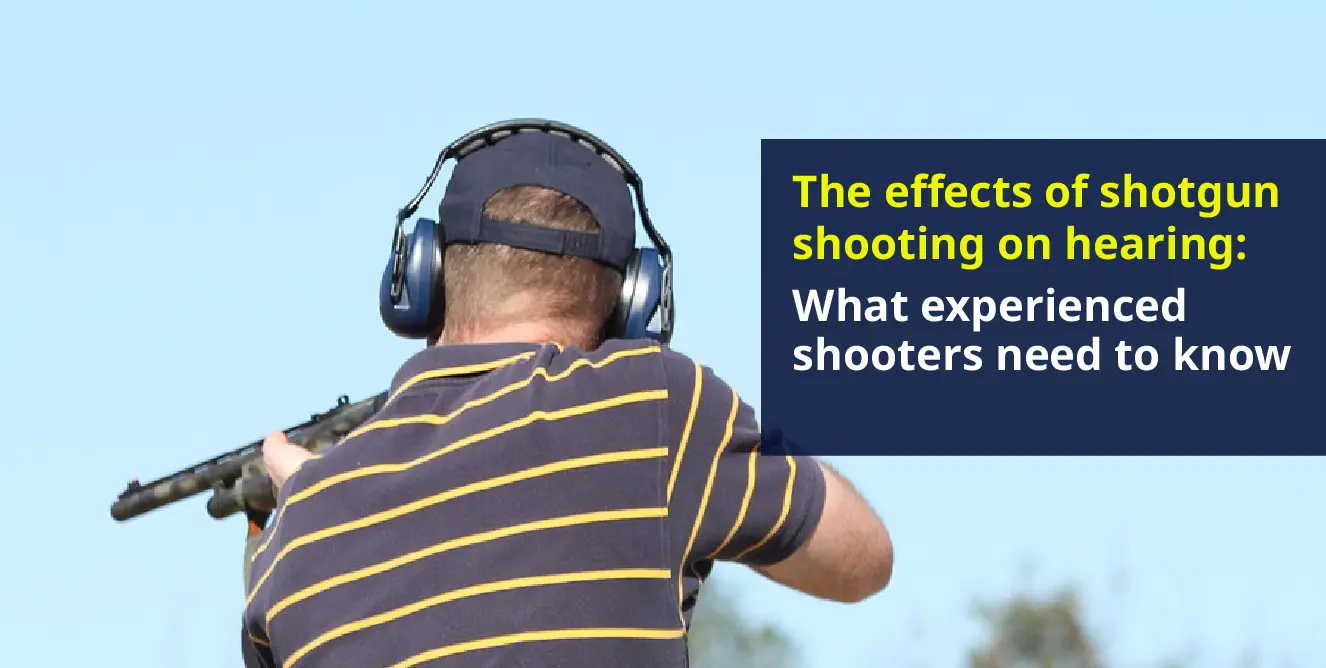The effects of shotgun shooting on hearing: What experienced shooters need to know
07-Aug-2024

Mark Eves
For seasoned shooters, the exhilaration of handling a shotgun is a well-known and valued experience. However, with years of shooting experience, it’s essential to have a thorough understanding of the long-term risks to your hearing health. Revisiting the effects of shotgun noise on hearing and emphasising the importance of protective measures are crucial for maintaining optimal auditory function.
Understanding shotgun noise and hearing damage
Shotguns generate noise levels that can exceed 140 decibels (dB), a level sufficient to cause immediate and irreversible damage to the structures of the inner ear. Prolonged exposure to such intense sounds can result in both temporary and permanent hearing loss.
Temporary threshold shifts (TTS) are a common consequence of shooting without adequate hearing protection. This temporary reduction in hearing sensitivity manifests as muffled hearing, tinnitus (ringing in the ears), and a sensation of fullness in the ears. Although TTS typically resolves within a few hours to a few days, repeated episodes can contribute to long-term damage.
Permanent threshold shifts (PTS), however, represent an irreversible loss of hearing sensitivity due to continuous exposure to loud noise. Symptoms of PTS include persistent hearing loss, chronic tinnitus, and difficulty understanding speech in noisy environments. Once PTS occurs, the damage is permanent, often requiring the use of hearing aids or other assistive devices.
Key factors influencing hearing damage
Several factors influence the extent of hearing damage from shotgun shooting. The frequency and duration of your exposure to shotgun blasts are significant contributors to the degree of hearing loss. Regular exposure, even with intermittent protection, can cumulatively degrade your hearing over time.
Environmental conditions also play a critical role. Shooting in enclosed or reflective spaces, such as indoor ranges, can amplify noise levels, thereby increasing the risk of hearing damage. While shooting outdoors may slightly reduce noise intensity, it does not eliminate the risk entirely.
The type of shotgun and ammunition used also impacts hearing damage. Larger gauges and heavier loads typically produce louder sounds, which can exacerbate the potential for hearing damage if protective measures are not consistently applied. For example, a 12-gauge shotgun generally produces more noise than a 20-gauge or 28-gauge shotgun. Opting for smaller gauge shotguns, like the 20-gauge or 28-gauge, can result in lower noise levels, thereby reducing the risk of hearing damage, provided all other factors remain constant.
Enhancing hearing protection strategies
As an experienced shooter, you likely already use hearing protection. However, there are ways to enhance your protective strategies to further safeguard your hearing.
Investing in high-quality hearing protection devices (HPDs) is essential. Custom-moulded earplugs provide a superior fit and higher level of protection compared to standard earplugs. Over-the-ear earmuffs, especially electronic models, offer additional defence by reducing harmful noise levels while allowing you to maintain situational awareness and communicate effectively.
Consider using advanced noise-cancelling devices specifically designed for shooters. Electronic earplugs and earmuffs that amplify low-level sounds while suppressing harmful noise can be particularly beneficial. These devices enable you to hear important environmental cues and conversations without exposing your ears to damaging noise levels.
Regular hearing assessments are another critical component of your hearing protection strategy. Periodic evaluations can help detect early signs of hearing loss, allowing for timely intervention. Monitoring your hearing health ensures that any issues are addressed promptly and protective measures are adjusted as needed.
Conclusion
For veteran shooters, protecting your hearing is paramount to continuing to enjoy your sport safely and effectively. Understanding the long-term effects of shotgun noise on hearing and consistently applying enhanced protective measures can significantly preserve your auditory health. Invest in high-quality hearing protection, remain mindful of your shooting environment, and commit to regular hearing assessments. Additionally, consider using smaller gauge shotguns to minimise noise exposure. By doing so, you can continue to enjoy the thrill of shooting while safeguarding your hearing for years to come. Stay vigilant and prioritise your auditory well-being.
Must read:

